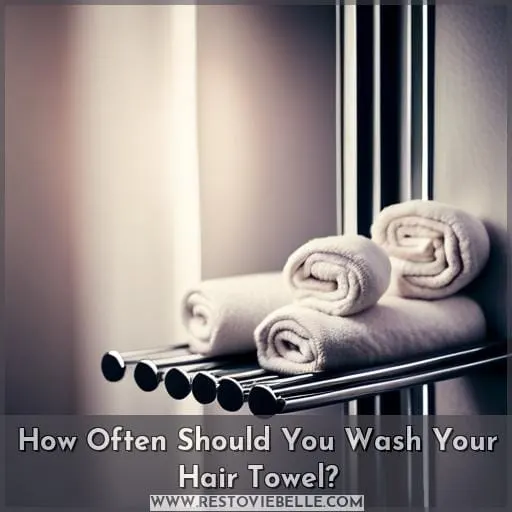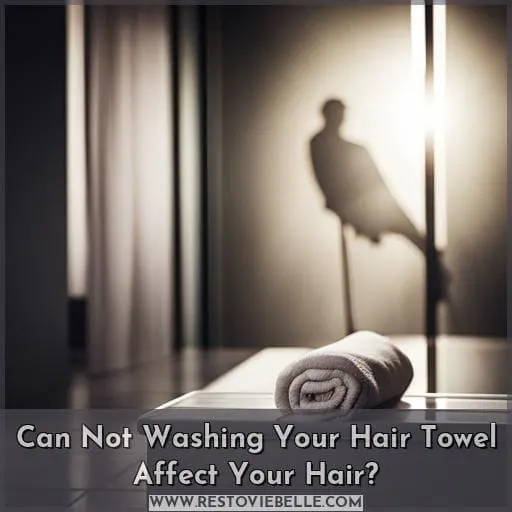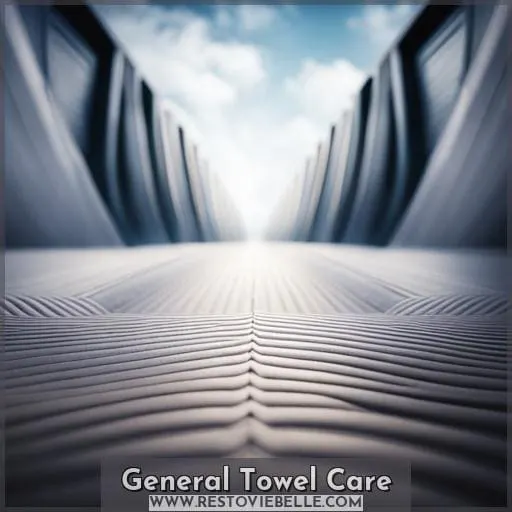This site is supported by our readers. We may earn a commission, at no cost to you, if you purchase through links.
 With the growing popularity of microfiber towels, it’s no wonder that the towel industry is expected to reach a whopping $15,900 million by 2025. But with so many options on offer, it can be difficult to decide which one works best for you.
With the growing popularity of microfiber towels, it’s no wonder that the towel industry is expected to reach a whopping $15,900 million by 2025. But with so many options on offer, it can be difficult to decide which one works best for you.
The answer lies in understanding why washing your hair towel is important, as well as knowing what type of product would benefit from frequent washing. Expert recommendations on how often to wash your hair towel can help you maintain cleanliness and hygiene.
Proper cleaning techniques are also crucial. This article will cover tips for cleaning your hair towel effectively. Additionally, general care advice, such as selecting the correct size and stretchability when ordering online, will be discussed.
Let’s get started!
Table Of Contents
- Key Takeaways
- Why is Washing Your Hair Towel Important?
- How Often Should You Wash Your Hair Towel?
- How to Properly Clean Your Hair Towel
- Can Not Washing Your Hair Towel Affect Your Hair?
- How Often Should You Wash Your Hair for Hair Growth?
- What About Microfiber Towels?
- Hair Towel Care and Usage Tips
- General Towel Care
- Conclusion
Key Takeaways
- Towel industry projected to reach $15,900 million by 2025.
- Importance of washing hair towel for hygiene.
- Frequency of washing depends on material and hair type.
- Risks of not washing: scalp infections, breakouts.
Why is Washing Your Hair Towel Important?
Maintaining a clean hair towel is essential for both hygiene and hair health. Not washing your towels often can lead to scalp infections, breakouts, and other issues with your hair, so it’s important to understand the risks of not washing regularly.
Hygiene and Hair Health
You need to regularly clean your hair towel in order to keep scalp infections, breakouts, and other issues at bay, while maintaining balanced health for both your hair and scalp. Microfiber and bamboo towels require less frequent washing than traditional cotton or terry cloth options.
If you suffer from dandruff, it’s recommended that you use a separate towel each day. Take into account your hair type when considering how often a towel needs to be washed. Thicker hair types may need more frequent care than finer strands of hair. Lastly, consider the benefits of choosing quality microfiber towels.
Risks of Not Washing Often
Neglecting to clean your hair towel can put you at risk for scalp infections, breakouts, and other hair issues. It’s essential to maintain a regular cleaning schedule based on the type of towel used. Microfiber towels require less frequent washing than traditional materials like cotton.
Not washing often enough can lead to skin health issues due to bacteria buildup from product residue or oil transfer onto the fabric. It also increases acne risk by spreading dirt and oils over multiple uses without proper cleaning protocols in place.
Dermatological impact aside, failing to wash your hair towel regularly will compromise hygiene standards. This could have long-term consequences for your overall hair care routine and health goals.
How Often Should You Wash Your Hair Towel?
Undoubtedly, the importance of washing your hair towel cannot be overstated. Experts recommend washing it after each use to maintain a healthy scalp and hair, as not doing so can lead to scalp infections or breakouts.
Expert Recommendations
Experts suggest regular maintenance of your towel to keep it in optimal condition. For hair health, they recommend washing the towel after every use, depending on the type of material and scalp health.
Microfiber and bamboo towels require less frequent washing than other materials; however, a separate towel should be used if you have dandruff. Adjusting your routine based on hair length and lifestyle is also important for balanced hygiene benefits.
Factors to Consider (Hair Type, Lifestyle, Dandruff)
When it comes to washing your hair towel, factors like hair type, lifestyle, and even dandruff should all be taken into account. For those with an oily scalp or dandruff, a separate towel may be the best way to manage the issue.
Hair texture also plays a role as curlier textures require more frequent washes than straight styles.
Lifestyle habits such as working out or swimming can also affect how often you need to wash your towels too; consider rotating between two towels if needed for extra hygiene! Lastly, regular cleaning of brushes and combs is important in order to keep them free from dirt and product buildup that could damage delicate strands.
How to Properly Clean Your Hair Towel
When it comes to washing your hair towels, proper and regular care is essential for both hygiene and hair health. Handwashing techniques should be used when possible, while machine washing tips must also be followed in order to ensure the longevity of your towel.
Handwashing Techniques
Properly cleaning your hair towel is essential for healthy hair and scalp. Handwashing it is the best way to ensure cleanliness. For a microfiber towel, use gentle detergent with lukewarm water and avoid any fabric softeners or bleach.
Once done, rinse thoroughly then wring out excess moisture before laying flat on a surface to air dry.
When not in use, fold your towels instead of hanging them. This will help them maintain their shape over time without becoming misshapen from gravity’s pull.
Machine Washing Tips
For machine washing, be sure to select a gentle cycle and avoid fabric softeners for optimal results.
- Separate lint-producing items like cotton and microfiber fabrics from other materials in the load.
- Use cold or warm water only, never hot—microfibers are heat sensitive!
- Skip fabric softener as it will reduce absorbency of microfiber towels over time.
- Hang dry or tumble dry low to prevent shrinkage and again follow any specific manufacturer directions provided with the towel(s).
When using your machine washer for cleaning hair towels, following these tips can help maintain their longevity while keeping them free of dirt/oil buildup that could damage delicate strands when reused without proper hygiene maintenance.
Can Not Washing Your Hair Towel Affect Your Hair?
Are you neglecting to wash your hair towel? It’s time to make it a priority. Not cleaning your absorbent towels can have serious consequences for the health of your hair and scalp.
For starters, when bacteria builds up in an unwashed towel, it is easily transferred onto the skin whenever you use it again – leading to scalp infections and breakouts. Furthermore, dirt and product buildup on a used hair towel will eventually be transferred back into freshly washed strands causing dryness or frizziness of the locks over time.
To avoid these issues from happening altogether, experts recommend washing each individual cloth after every use as well as changing out shampoo frequency depending on one’s type of curl pattern or lifestyle habits like working out regularly with sweaty sessions afterwards- all factors that may require extra cleanups more than usual!
The importance lies in maintaining proper hygiene for balanced growth which begins with investing in quality microfiber materials such as bamboo fibers instead of just any old t-shirt fabric alternative; they are specifically designed for maximum absorption while also being gentle enough not to harm delicate follicles during drying processes – so consider this before making any purchase decisions too!
How Often Should You Wash Your Hair for Hair Growth?
You need to keep your scalp clean for healthy hair growth; regular washing is essential. For optimal hair health, you should wash your hair with shampoo and conditioner 2-3 times a week. Depending on the texture of your hair, scalp health issues such as dandruff or product buildup can require more frequent washes.
Additionally, lifestyle factors like swimming in chlorine pools or using heavy styling products will also affect how often you should be washing your locks!
For those days when you’re not able to shower but still want fresh tresses, it’s important to remember that even though microfiber towels are highly absorbent and dry quickly they still need proper cleaning—ideally after every use if possible! Organic cotton towels may require less frequent laundry because their fibers don’t trap oils and bacteria like synthetic materials do.
However, both types must be washed regularly so they don’t transfer dirt from one head of hair onto another leading to product build up which can cause breakouts or other skin irritations along with reducing overall productivity of the strands themselves over time.
So no matter what type towel you choose, make sure it’s cleaned on a regular basis for maximum curl care benefits!
What About Microfiber Towels?
Microfiber towels offer a variety of benefits for hair care and hygiene. They are lightweight, highly absorbent, dry quickly, reduce frizz, and can hold up to 7 times their weight in water. Washing your microfiber towel after every use is important for maintaining its effectiveness as well as promoting scalp health.
Benefits of Microfiber Towels
Gently rubbing a microfiber towel through your locks dries your hair faster while reducing frizz and guarding against scalp infections. Microfiber towels are more efficient than t-shirts, bamboo towels, or other materials.
With up to 200,000 threads per square inch compared to cotton’s 10-20 thousand threads – its absorbency rate is seven times greater! Quality matters for longevity as low-grade versions may shrink after washing.
Washing Frequency for Microfiber Towels
To ensure proper hygiene and hair health, it’s important to wash your microfiber towels regularly. The benefits of using a high-quality microfiber towel are extensive; however, the dirt and oils collected can cause scalp infections or breakouts if not handled properly.
Washing frequency should be adjusted based on lifestyle and hair type – experts suggest washing after each use for optimal results. Machine washing is recommended with no fabric softener, but always follow manufacturer instructions first.
Don’t forget to factor in the size when choosing a towel too! A larger one works best for long tresses, while smaller ones work better for short cuts or thin strands of hair.
Hair Towel Care and Usage Tips
Whether you choose a microfiber towel or a t-shirt hair towel, it is important to consider its size and stretchability. The Sunrise Bliss t-shirt hair towels come in two sizes – small/medium and large/xlarge – with extra softness for maximum comfort while drying your wet hair.
Size Selection and Stretchability
When selecting a microfiber hair towel, it’s important to consider the size and stretchability of the fabric. For proper wrapping, choose one that matches your hair length; for instance, extra-long towels are best suited for long locks.
The Sunrise Bliss t-shirt is an excellent choice as its cotton material offers extraordinary stretch capabilities without damaging your delicate curls or waves. Additionally, you can rotate between two towels when doing laundry; this ensures cleanliness while avoiding product buildup in one cloth over time.
Ordering and Shipping Details
You can order the Sunrise Bliss t-shirt hair towel online, with free shipping on orders over $35. The ordering process is easy and secure, offering a variety of payment methods including PayPal and major credit cards.
Delivery options include Standard Shipping (2-3 business days) or Express Shipping (1 business day). Customers in the US are eligible for returns within 30 days of purchase if they meet certain conditions.
Reviews from customers confirm that this product is both reliable and effective when used correctly! Whether you need to replace your existing hair towels or want to give it a try for yourself, this high-quality product will not disappoint!
General Towel Care
Maintaining a clean and hygienic hair care routine is important for both a healthy scalp and hair. Regularly washing your towels, as well as your brushes, helps ensure that dirt, oil, or product buildup doesn’t transfer to the hair.
It also prevents scalp infections caused by bacteria buildup on the towel fibers.
Importance of Regular Washing
Regularly refreshing your hair towel is essential for a healthy scalp and luscious locks! Washing it regularly ensures hygiene benefits, skin health, and prevents bacterial growth. For optimal results, aim to wash your towel after every use. Doing so will lengthen its lifespan while also preventing product buildup from damaging the texture of your hair.
Additionally, consider using different towels depending on the type of activity you are doing – like separating gym towels from everyday ones – as this can further reduce transferable dirt or bacteria onto clean areas.
Washing Frequency for Hair Brushes
For hygiene and hair care, it’s essential to clean your hair brushes regularly with the appropriate frequency.
- Clean the bristles at least once a week with gentle soap and warm water.
- Rinse thoroughly under running water before air drying on a towel or rack away from direct sunlight.
- Remove tangles and knots frequently using a comb or brush pick designed specifically for this purpose – never use scissors! With proper maintenance, you’ll have beautiful-looking hairstyles every time you go out!
Conclusion
It’s important to keep your hair and scalp healthy by washing your hair towel regularly. But how often should you do it? Experts recommend washing your hair towel after every use. This is especially important if you have dandruff, as you may need to use a separate towel.
Microfiber towels require less frequent washing and have a number of benefits, such as reducing frizz and drying hair faster. To ensure your hair and scalp stay healthy, follow the manufacturer’s instructions for washing your towel.
It’s also important to adjust your washing routine based on your hair type and lifestyle.
Proper care and usage of your hair towel will help keep your hair and scalp in optimal condition.













